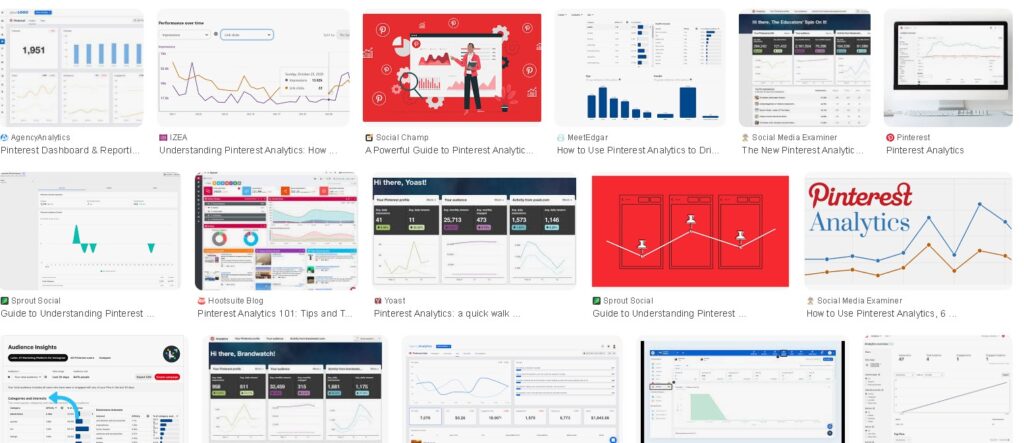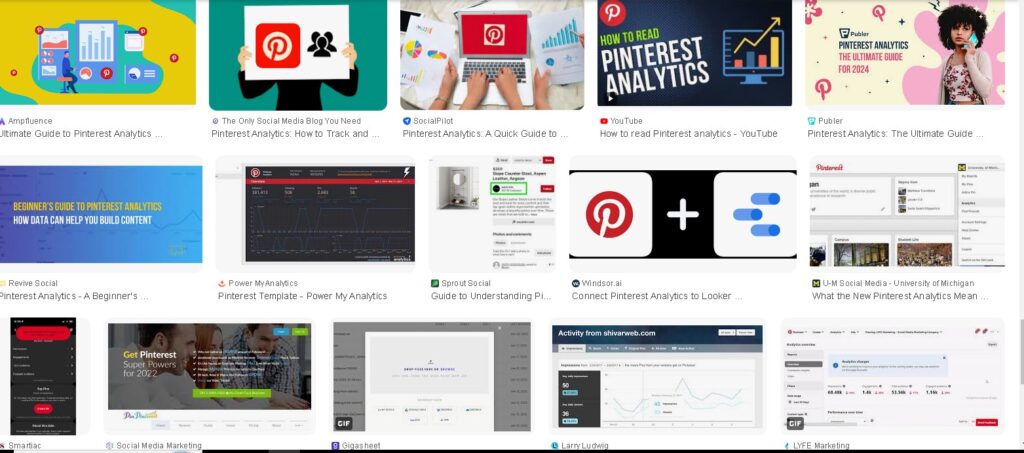Pinterest Analytics vs Google Analytics: A Comprehensive Comparison
When tracking your online performance, two of the most popular tools are Pinterest Analytics and Google Analytics. In Pinterest Analytics vs Google Analytics both offer valuable insights into your content, audience behavior, and traffic, but they cater to different purposes. Understanding the Pinterest Analytics vs Google Analytics can help you maximize the potential of both tools and build a more effective marketing strategy.
In this post, we’ll dive deep into Pinterest Analytics vs Google Analytics, highlighting their features, strengths, and how you can use each tool to grow your online presence.
What is Pinterest Analytics?
Pinterest Analytics is a built-in analytics tool by Pinterest for business accounts. It offers insights into how your pins and boards perform, allowing you to track metrics like impressions, saves, clicks, and audience engagement. This tool is essential for businesses or content creators who use Pinterest to drive traffic or engage with users.
What is Google Analytics?
Google Analytics, on the other hand, is a universal web analytics tool used to track traffic, conversions, user behavior, and much more. It provides a comprehensive overview of how users interact with your website across various channels, including social media, search engines, and direct traffic. Google Analytics is widely used by businesses to measure website performance and optimize their digital marketing strategies.

Key Features: Pinterest Analytics vs Google Analytics
While both tools provide valuable insights, Pinterest Analytics vs Google Analytics are designed for different purposes. Let’s explore the key differences between these two platforms:
- Platform Focus:
- Pinterest Analytics: Focuses solely on how your content performs within the Pinterest platform. It tracks engagement metrics specific to Pinterest, such as saves (repins), clicks, impressions, and follower growth. Pinterest Analytics helps you understand what content resonates with your audience and how to improve your Pinterest strategy.
- Google Analytics: Provides a broader view of your entire website’s traffic, regardless of where it comes from. It tracks all traffic, including Pinterest, but covers search engines, direct visitors, paid ads, and social media platforms. It’s more about your website’s overall performance than just one platform.
2. Audience Insights:
- Pinterest Analytics: Pinterest Analytics offers detailed audience insights within Pinterest itself. You can view demographics like age, gender, location, and interests of your Pinterest followers. This helps you tailor your content to your Pinterest audience’s preferences.
- Google Analytics: Google Analytics offers detailed demographics and interest reports for all your website visitors, regardless of the platform they come from. This includes traffic from Pinterest, but also traffic from other social media sites, search engines, and referral links.
3. Tracking Conversions:
- Pinterest Analytics: You can track how many users click on your pins and whether they visit your website or landing pages. However, Pinterest Analytics doesn’t provide deep insights into what users do after they leave Pinterest and land on your website.
- Google Analytics: Google Analytics excels at tracking what users do once they land on your website, including conversions like purchases, form submissions, and sign-ups. It tracks user behavior, identifies conversion funnels, and measures specific goals or events.
4. Pin vs. Website Performance:
- Pinterest Analytics: This tool is primarily designed to help you optimize your Pinterest marketing strategy. It provides data on individual pins and boards, allowing you to see which pins perform the best and what types of content drive engagement.
- Google Analytics: While Google Analytics does track Pinterest referral traffic, it goes beyond individual pins. It helps you analyze overall website performance, which pages get the most traffic, user behavior, bounce rates, and session duration.
5. User Behavior Tracking:
- Pinterest Analytics: While it shows you the actions users take on Pinterest like saves, repins, and link clicks, it doesn’t show you what they do on your website. Pinterest Analytics is more about optimizing your content on the Pinterest platform itself.
- Google Analytics: Google Analytics tracks every aspect of user behavior once they enter your website. You can follow a user’s journey through multiple pages, analyze bounce rates, measure time on site, and see how users navigate your content.

How to Use Pinterest Analytics vs Google Analytics Together
For businesses that use Pinterest as part of their broader marketing strategy, both Pinterest Analytics and Google Analytics are useful tools, with unique benefits. Here’s how you can use both in tandem:
- Use Pinterest Analytics to Improve Pinterest Strategy: Pinterest Analytics helps you understand which pins have the most engagement, which boards are popular, and what content your audience is interested in. Use these insights to create engaging pins that attract more saves, clicks, and followers.
- Use Google Analytics to Track Traffic from Pinterest: Google Analytics gives you the bigger picture of what happens when users leave Pinterest and arrive on your website. Use it to track how much traffic Pinterest drives, how Pinterest users behave on your site, and whether they convert into customers or subscribers.
- Measure Conversions: Pinterest Analytics is useful for understanding pin-level performance, while Google Analytics is perfect for tracking overall conversions and measuring your ROI from Pinterest traffic. Set up UTM parameters in Google Analytics to track which specific pins drive conversions.
- Analyze Audience Demographics: Pinterest Analytics can help you understand your Pinterest audience, but Google Analytics gives you insights into your total audience. By comparing data from both tools, you can create more targeted marketing campaigns across platforms.
Conclusion
In Pinterest Analytics vs Google Analytics serve different purposes and offer valuable insights in their respective areas. While Pinterest Analytics is crucial for optimizing your content on Pinterest, Google Analytics provides a broader look at your overall website performance. In Pinterest Analytics vs Google Analytics, by using both tools together, you can gain a comprehensive understanding of how your Pinterest efforts impact your website’s traffic and conversions.
Understanding these Pinterest Analytics vs Google Analytics allow you to optimize your strategy on Pinterest while keeping track of your website’s overall performance. Whether focused on Pinterest-specific marketing or tracking all your online efforts, combining these two powerful tools will help you create a well-rounded digital marketing strategy.
